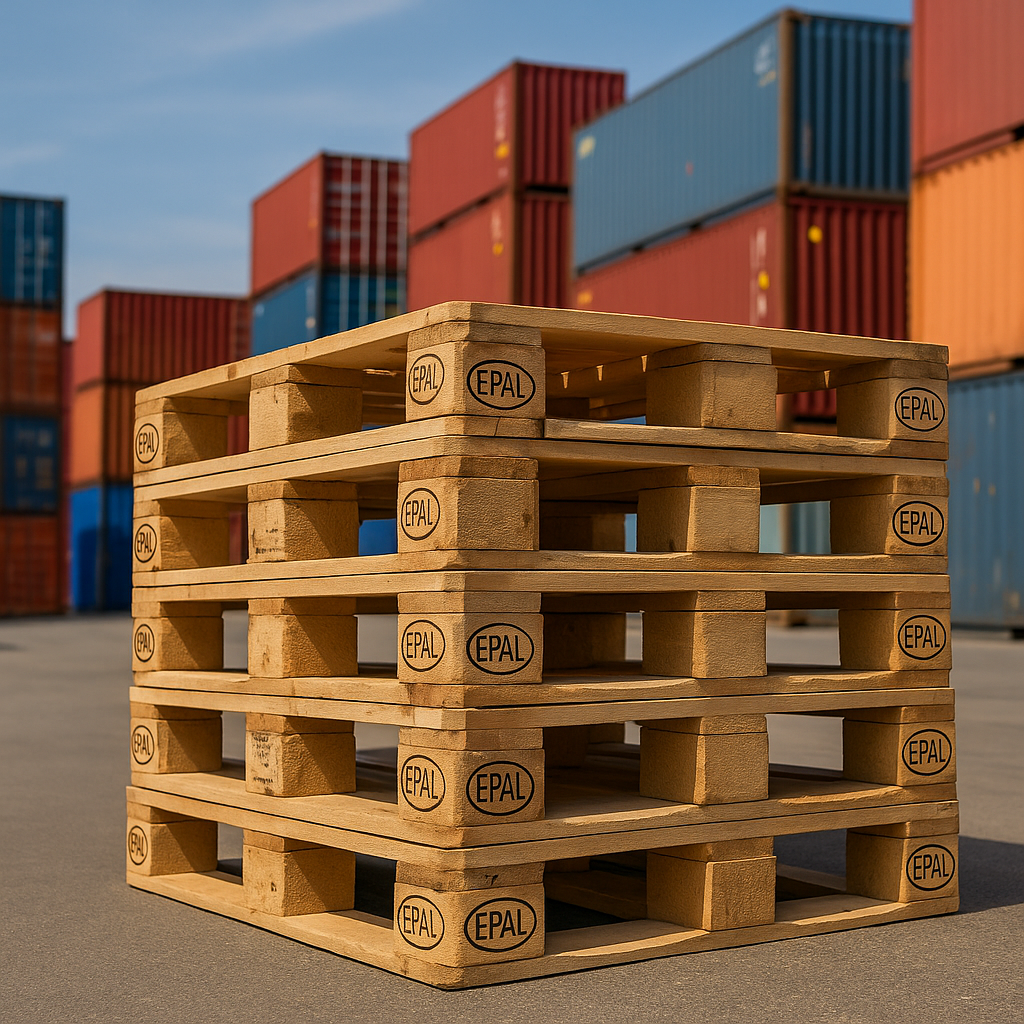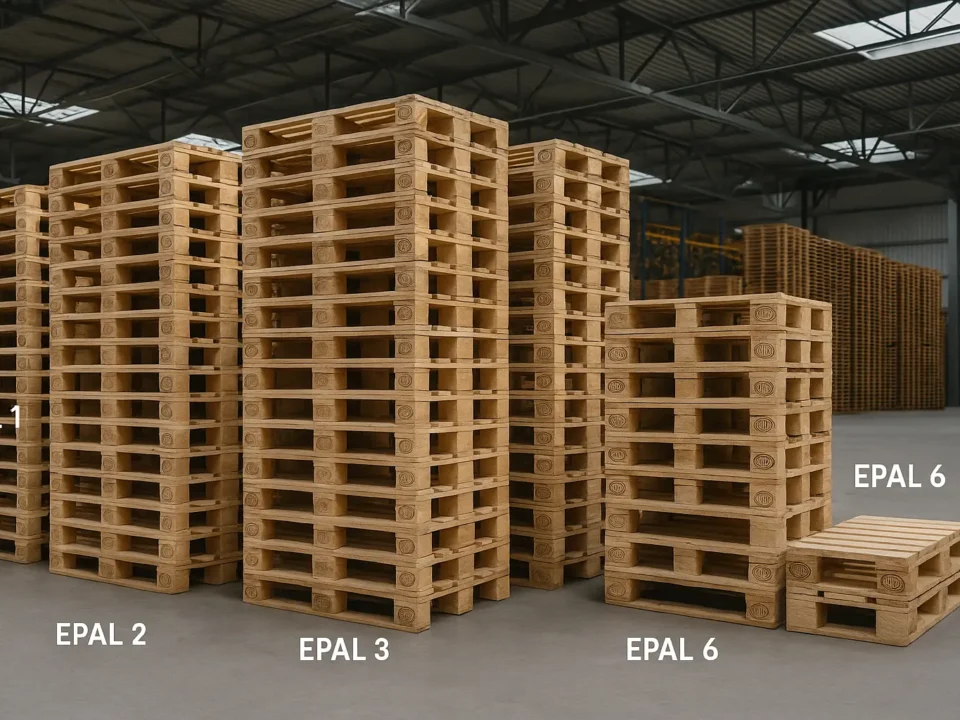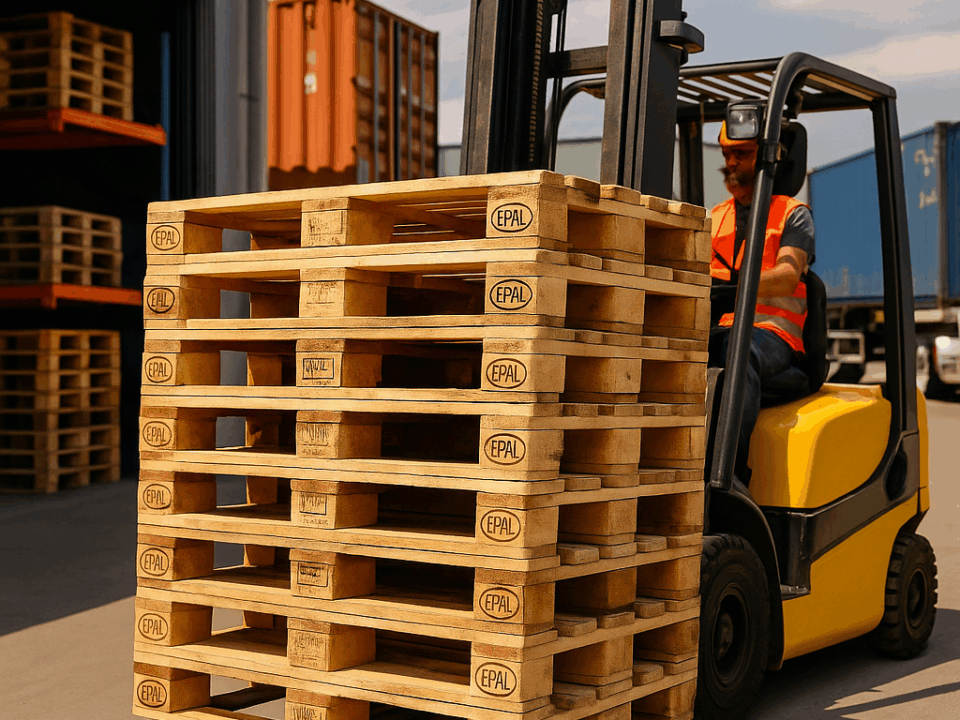- Skylar Impex
- +91 7506004348
- 02245124301
- skylarimpex@gmail.com

Hardwood vs Softwood Pallets – Which One Should You Choose?
March 13, 2025
EPAL Pallets vs. Non-EPAL Pallets: What’s the Difference?
May 22, 2025What Is an EPAL Pallet and Why Does It Matter in Global Shipping
Introduction
Shipping today depends on speed, safety, and standardization. Behind the scenes, pallets play a major role in moving goods. Among them, EPAL pallets stand out. These certified wooden platforms keep cargo safe and customs officers happy. In global trade, using the right pallet can mean the difference between smooth delivery and a costly delay.
EPAL pallets play a crucial role in international logistics. Businesses that require certified, export-ready solutions often rely on EPAL pallets from a trusted manufacturer in Navi Mumbai.
What Is an EPAL Pallet?
EPAL stands for European Pallet Association. An EPAL pallet is a wooden pallet built to the highest quality standards. It carries a special stamp as proof of certification. This pallet is not just a platform—it’s a global passport for goods. With standard size (1200 x 800 mm), strong materials, and strict checks, EPAL pallets move goods across countries without trouble.
Each EPAL pallet has marks showing the country of origin, the producer’s license number, and the heat treatment stamp. These show it’s safe, strong, and ready for international shipping.
EPAL Pallet Specifications and Standards
The standard EPAL pallet sizes are 1200 x 800 mm. It’s made of heat-treated wood that follows ISPM 15 standards. That means it’s safe from pests and approved for export. The pallet can carry heavy loads and fit into racks, containers, and forklifts easily. It also uses approved nails and a specific structure to ensure safety and reuse.
Each pallet has:
- EPAL logo on both side blocks
- Heat treatment (HT) stamp
- Country code and license number
- Nail pattern to prevent tampering
Why Certification Matters in International Trade
International shipping rules are strict. Countries don’t want to import pests with packaging. That’s why they require ISPM 15-compliant pallets. EPAL pallets meet those rules. Without certified pallets, shipments may be delayed, fined, or rejected at the border.
When you use EPAL pallets, customs officers know your packaging is pest-free and safe. You avoid the hassle of inspections or repackaging. EPAL certification builds trust between sellers, shippers, and buyers.
Key Benefits of Using EPAL Pallets
Why do top businesses choose EPAL pallets? Because they’re:
- Reusable: One pallet can be used many times.
- Strong: Made to handle heavy goods without breaking.
- Standardized: One size fits all—across countries and supply chains.
- Repairable: Broken parts can be replaced.
- Eco-friendly: Made from renewable wood and can be recycled.
- Easy to Handle: Works with forklifts and pallet jacks.
- Globally Accepted: Trusted at ports and customs worldwide.
Common Applications Across Industries
EPAL pallets are used in many sectors:
- Export and Logistics: For shipping across borders.
- Pharma: For clean and secure packaging.
- Food: For hygienic transport.
- Automotive: For heavy machinery parts.
- Retail and FMCG: For warehouse and store deliveries.
- Cold Storage: For stable storage in chilled conditions.
These industries rely on strong, safe, and globally accepted pallets.
EPAL Pallets vs. Non-Certified Alternatives
Non-certified pallets may look cheaper, but they can cost more in the long run. Here’s why:
- No Compliance: They may not meet ISPM 15 rules.
- Customs Risk: Higher chance of delays, fines, or rejections.
- Lower Strength: They may break under load.
- Short Life: Not made for repeated use.
EPAL pallets give peace of mind. You know your packaging will pass inspections and protect your goods.
Conclusion
In global trade, every detail matters. EPAL pallets protect your cargo, your timeline, and your reputation. They are more than wood—they are your partner in smooth shipping. Choose certified, strong, and reliable EPAL pallets for every shipment.
Need help sourcing EPAL pallets? Contact our team today. Let’s move your goods safely and efficiently.
Frequently Asked Questions (FAQs)
1. What is the size of a standard EPAL pallet?
The standard size is 1200 x 800 mm. It fits most shipping and storage systems.
2. Are EPAL pallets certified for export?
Yes. EPAL pallets meet ISPM 15 standards and are certified for global shipping.
3. Can I reuse EPAL pallets?
Yes. They are made for multiple uses and can be repaired if needed.
4. How do I check if a pallet is EPAL certified?
Look for the EPAL logo, heat treatment stamp, and license number on the side blocks.
5. What industries use EPAL pallets?
Industries like pharma, food, export, retail, and logistics use EPAL pallets for safe transport.
6. Do EPAL pallets help reduce customs issues?
Yes. Certified pallets reduce the risk of delays, rejections, and extra checks at borders.





